Running business purchases can soon get tricky without appropriate tools at hand. This is where eProcurement Platform comes in, assisting organizations to automate purchase orders, managing costs, and streamline suppliers. Rather than using manual methods and records that are available in different places, businesses can use these platforms to add accuracy, transparency, and efficiency to the eProcurement cycle.
The optimal eProcurement system not only minimizes the cost but also increases teamwork between employees and vendors and operates in line with company policies. The range of new-fangled features in eProcurement solution, such as automated workflows, real-time reporting, and centralized data management, can enable businesses to enhance supplier relationships and make more advanced purchasing decisions overall.
This guide provides an overview of the best eProcurement Software in 2025 by showcasing the leading solutions to streamline spending and enhance the effectiveness of the overall supply chain.
Why eProcurement Software Matters
- Cost control: Eliminates maverick spend as well as exploits bulk pricing.
- Efficiency increase: approvals are automated and documents are routed, and manual errors are eliminated.
- Transparency: Provides complete audit trails of spending and supplier activity.
- Compliance/execution: governance: Enforces policies, hierarchies of approvals.
- Strategic insights: Once functioning as an instrument to establish smarter purchasing decisions, data analytics services could help.
List of Top 10 eProcurement Software Solutions
1. SAP Ariba
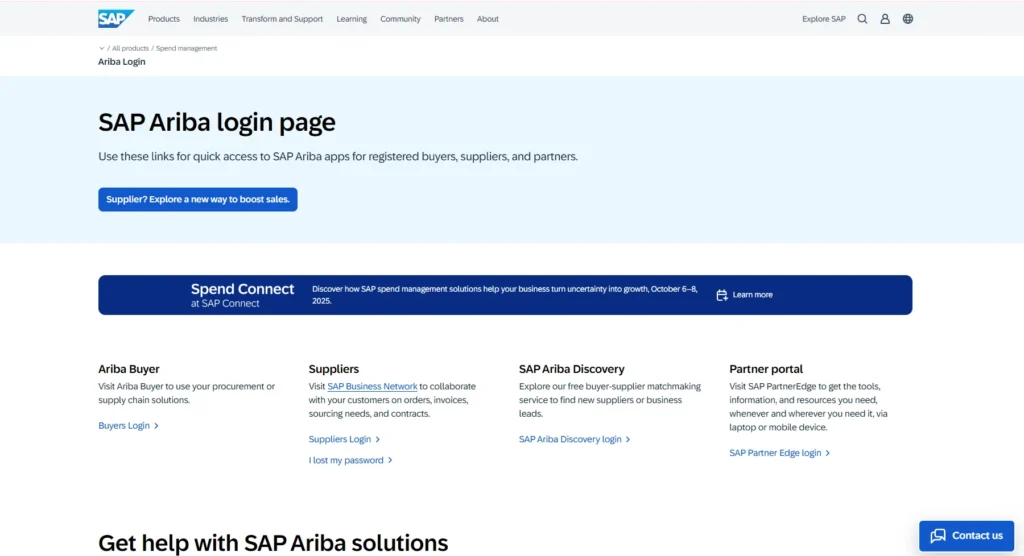
SAP Ariba is a prominent eProcurement tool with a track record that has earned much trust in enterprises. It simplifies sourcing, supplier management, invoicing, and contract compliance in a single platform. It has the advantage that it is thoroughly integrated with SAP ERP, hence suitable in cases of companies having complicated supply chains.
Ariba also offers sophisticated analytics, so that, in addition to managing the costs, the business is able to build strong supplier relationships due to real-time collaboration and transparency.
Features:
- Performance and management of the supplier lifecycle
- Automation of the sourcing and eProcurement processes
- Real-time reporting and spend analysis
- Contract and management compliance
- Supply chain partnerships all over the world
Best For: Enterprises and international corporations that have a high budget for purchasing.
Pricing:
- Membership plans on the supplying side are $50 to $7500+ per year
- Enterprise users pay per transaction
2. Oneflow

Oneflow targets the streamlining of the most important element in eProcurement contracts. It can help businesses in drawing, bargaining, and handling completely digital contracts that are time-efficient and error-free. In contrast to fixed PDFs, Oneflow contracts are interactive and cooperative, where buyers and suppliers can collaborate in real-time.
Through automation and templates and with secure sharing, Oneflow is a contemporary business tool when a company is looking to save on supplier negotiations and agreements.
Features:
- Digital contract development and working with each other
- Tracking and editing of contracts in real time
- Approval workflows/signoff
- Template and contract safe-storage
- Reconnectivity to well-known business apps
Best For: Firms that wish to computerize and automate their purchase decisions.
Pricing:
- Basic: e-signatures (free)
- Basics: ~20/user/mth
- Business: ~ 54 dollars per user per month
- Enterprise: Custom pricing
3. Precoro
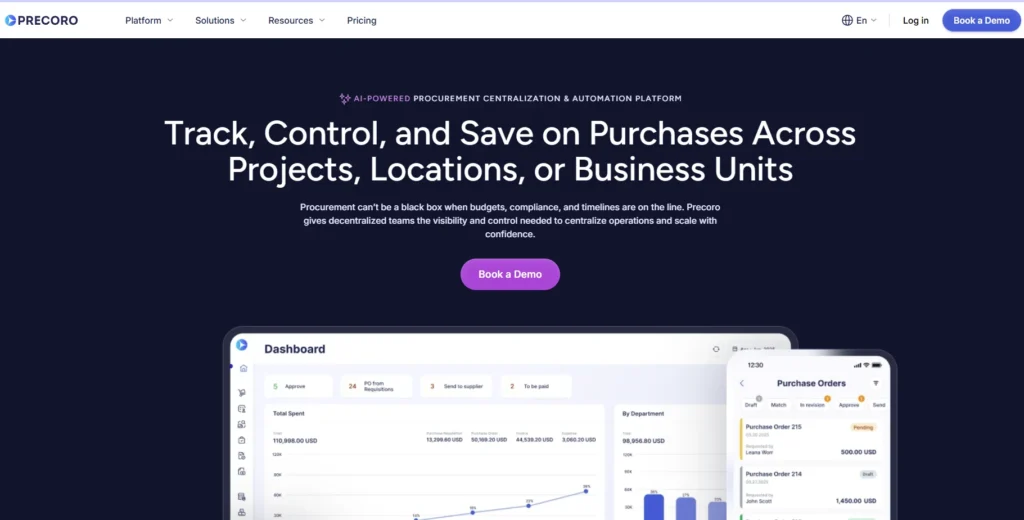
Precoro is a cloud-based eProcurement solution that is supposed to make purchase orders, amounts of approval amounts, and budgeting easier. It nixes the use of paper, allows efficient transitions in processing permission, and delivers transparency to company expenditure.
Our integrations with QuickBooks, Xero, and Slack allow Precoro to fit into expanding businesses. It is so easy to use that it is appealing to SMBs and mid-sized organizations, who can enjoy the benefits of efficiency in eProcurement without being as complex as enterprise systems.
Features:
- Automated company request orders and acceptance
- Tracking of budget and spending visibility
- Supplier-catalogue administration
- Connection to accounting programmes (QuickBooks, Xero)
- Customizable reporting
Best For: Small and medium-sized businesses want straightforward, cost-efficient eProcurement automation.
Pricing:
- Base: ~$499 a month (paid annually)
4. Team Procure
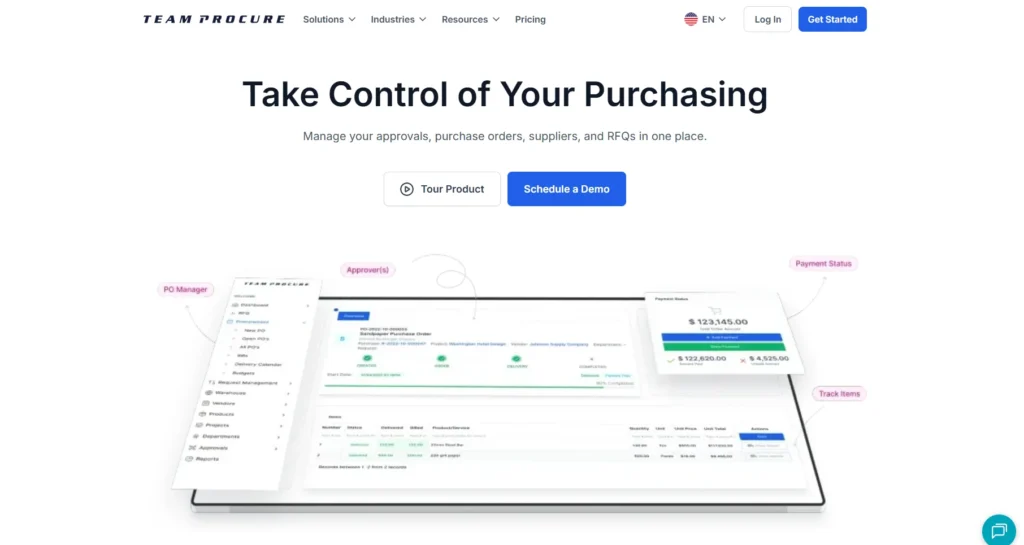
Atproc Team Procure is a simple-to-use eProcurement solution suitable for SMBs. It includes purchase requests, supplier management, RFQs, inventory, and approval workflows in a single platform. It allows businesses to have transparency on the eProcurement processes since it comes with QuickBooks integration and real-time reporting.
Its cheapness and ease of use ensure that it is a good choice when companies are expanding their eProcurement department, but do not rely on heavy ERPs.
Features:
- To purchase and request management
- Supplier onboarding and supplier FQs
- Inventory management and tracking
- Approval workflows with a Question form
- QuickBooks Integration
Best For: SMBs need a cost-effective eProcurement and inventory management program.
Pricing:
- Starts at 250/month for up to 3 users
5. NetSuite Procurement
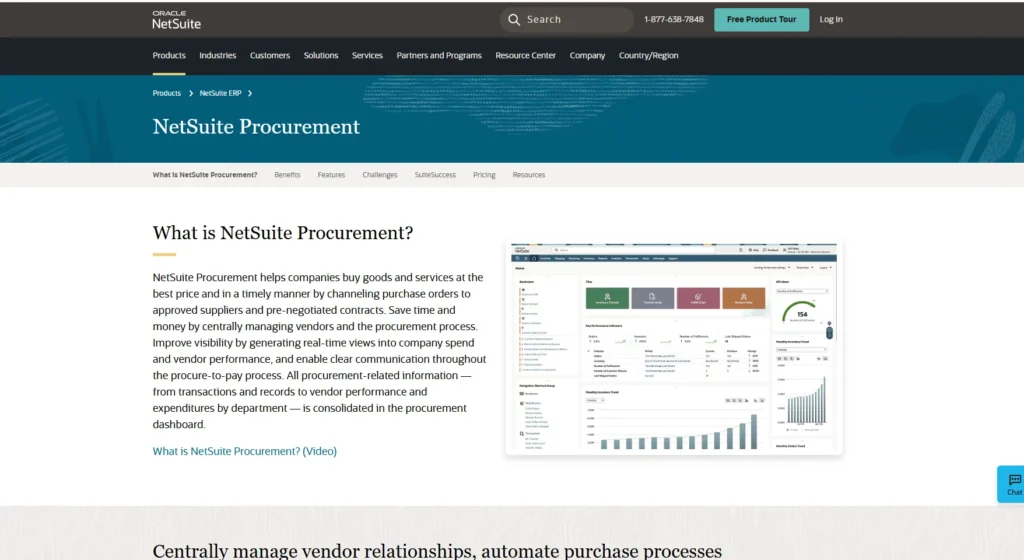
Oracle NetSuite ERP integrates the Oracle NetSuite Procurement system with the company’s cost accounting system and supply chain, enabling an end-to-end process of business functions. It also normalizes vendor rates, automates requisitions, and enforces compliance in purchases across the enterprise.
NetSuite complements AI-driven capabilities so that companies can make more accurate buying decisions and engage suppliers more effectively. Judging by its integration of eProcurement with ERP, it is quite strong, as it is a preferred choice for mid-to-large-sized businesses in need of unified systems.
Features:
- Automated invoice and approvals
- Supplier consistency and contacting undermining
- The integrated financials and supply chain management
- The spent visibility is gained in the real-time analytics
- eProcurement prodding is AI-driven
Best For: Companies seeking an end-to-end ERP with eProcurement included.
Pricing:
- $50,000–$500,000/year.
6. Coupa
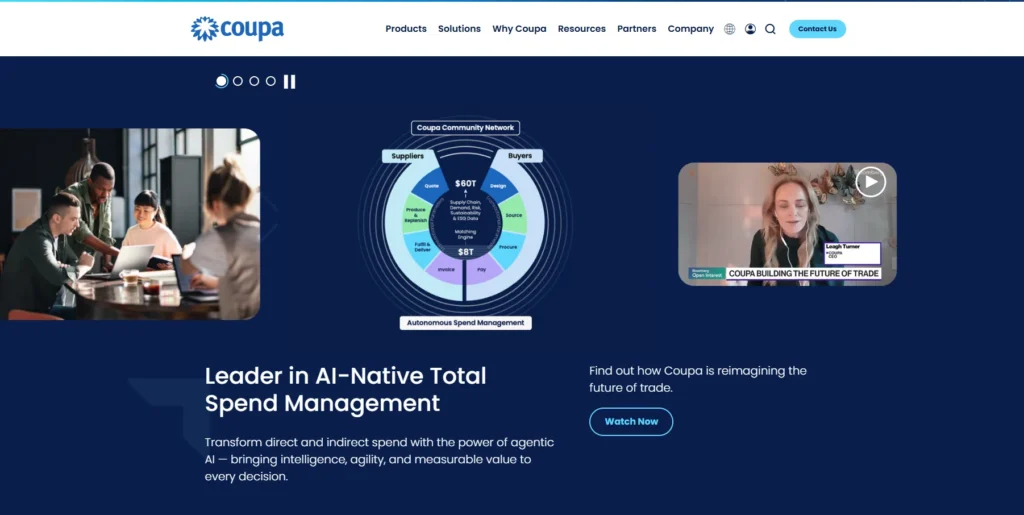
Coupa is an efficient spend management and eProcurement Software designed to address the needs of an enterprise seeking to gain visibility and control over every dollar spent. It functions not only as a eProcurement platform but also complements risk management software by enabling real-time analytics on spend, on-demand supplier collaboration, and supplier risk management.
Coupa provides consumer-friendly dashboards and predictions to help organizations experience efficiency and cost savings. Although it is more costly, its range of features makes it an ideal option even amongst large firms.
Features:
- Spend analytics and insights
- Collaboration/management of suppliers
- Automatic eProcurement process
- Testing and reporting of failure to comply
- Cost optimization by AI
Best For: Large businesses require sophisticated spend management and collaboration with their suppliers.
Pricing:
- $2,500/month+
7. Salesforce
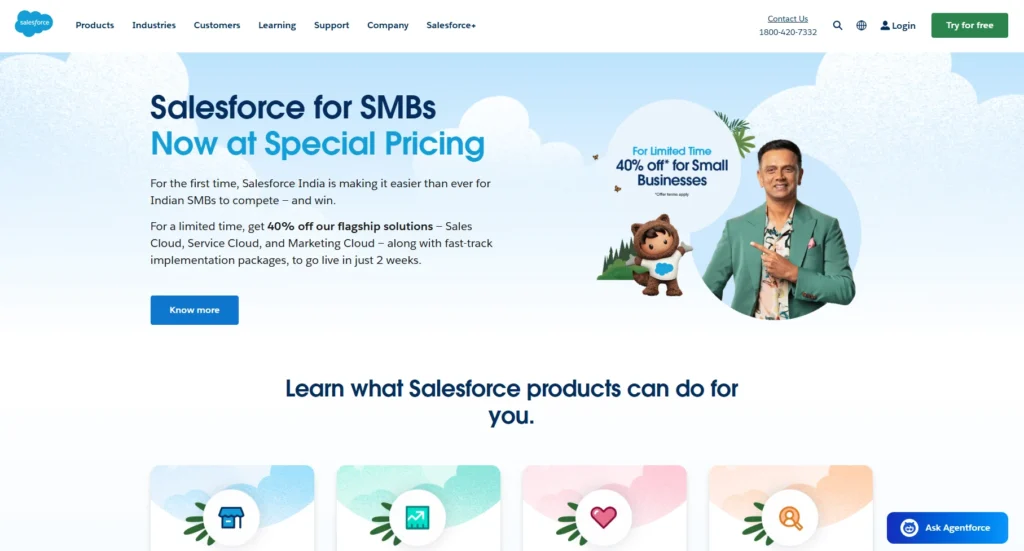
Salesforce does not provide eProcurement Software per se, though eProcurement -specific integrations and apps are available. Organizations that have implemented Salesforce as an AI CRM tool can easily integrate eProcurement , approval processes, and supplier management without changing platforms. This is what makes it a versatile solution for companies that want eProcurement tightly connected to customer and sales data.
Features:
- Integrations that were done with eProcurement workflows
- Performance tracking and approval systems, supplier tracking
- Contract Management and Documents
- Real-time reporting/dashboards
- Integrates with the Salesforce environment
Best For: Organizations with a significant sunk cost in Salesforce CRM, and which would like eProcurement to lie within the same ecosystem.
Pricing:
- From $25/user/month (custom for eProcurement )
8. Vendr
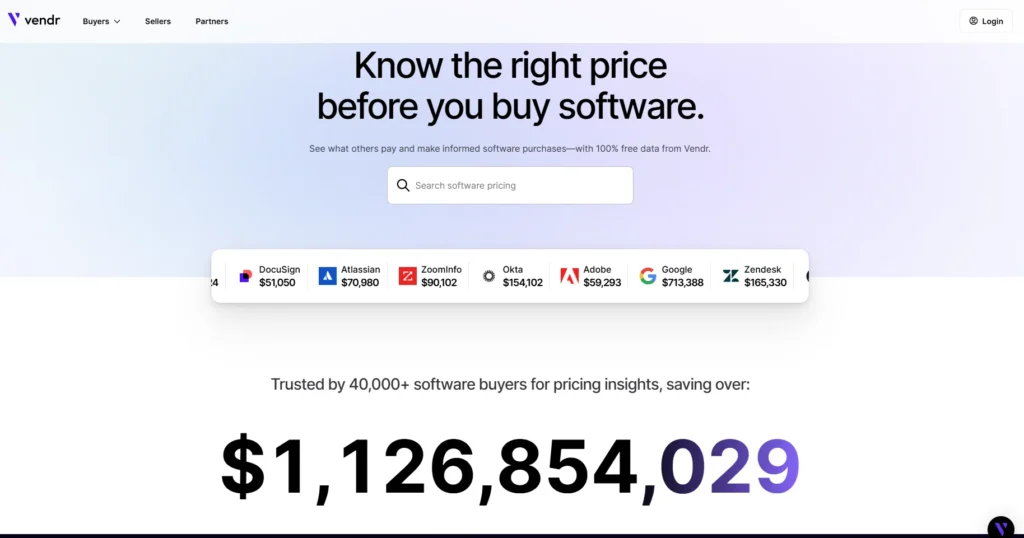
Vendr is a software-as-a-service eProcurement system that is best suited to streamline software expenditure. It assists enterprises to acquire, renew, and negotiate SaaS deals with utmost savings. Vendr uses benchmarking on thousands of transactions to make sure businesses do not overspend on software.
It automates approval actions, following renewals, and helps teams save time and money, besides introducing more transparency in SaaS purchasing. Being software-centric, it is particularly useful in tech-based organizations using significant volumes of SaaS. Vendr also offers comprehensive reporting modules and intelligence to assist the management in planning and streamlining future SaaS budgets.
Features:
- Negotiation and renewal of contracts
- Benchmark cost saving Targets
- Semi-automated approvals
- Renewal reminders
- Spend visibility
Best For: Companies with multiple SaaS subscriptions and licenses.
Pricing:
- Begins at approximately 35k/ year (enterprise-level rates).
9. Monday.com (Customization as eProcurement )
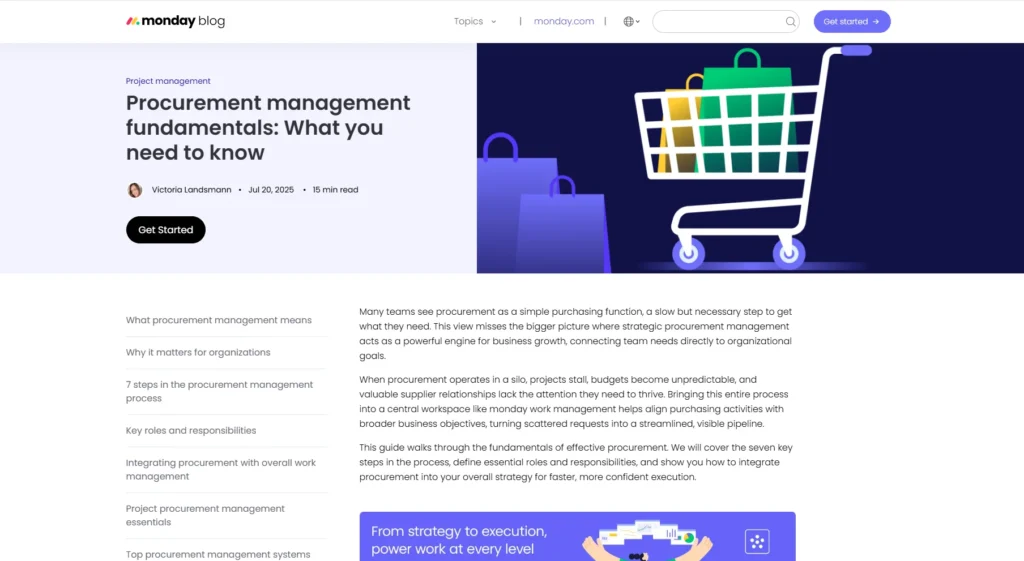
Monday.com is not set up as a data source eProcurement tool out of the box; however, using boards, automations, and integrations, teams are able to create the workflow they desire. It can process purchase requests, approvals, and tracking of vendors in a customizable manner. Monday.com is a cheaper and flexible alternative to enterprise-based eProcurement systems that businesses that do not require such an advanced system do not need.
It has a modular feature that allows businesses to begin on a small scale, then develop more eProcurement capabilities with time. It is also able to do real-time collaboration between teams to enhance communication between finance, eProcurement , and operations.
Features:
- Configurable purchasing boards
- Automation and Approvals Workflow
- Supplier tracking
- Finance tool integrations
- Working together and reporting
Best For: SMBs that require flexible and light eProcurement processes.
Pricing:
- Begins at 9 per seat per month (Basic plan).
Also Read : Invoicing software for Small Businesses
10. Procurify
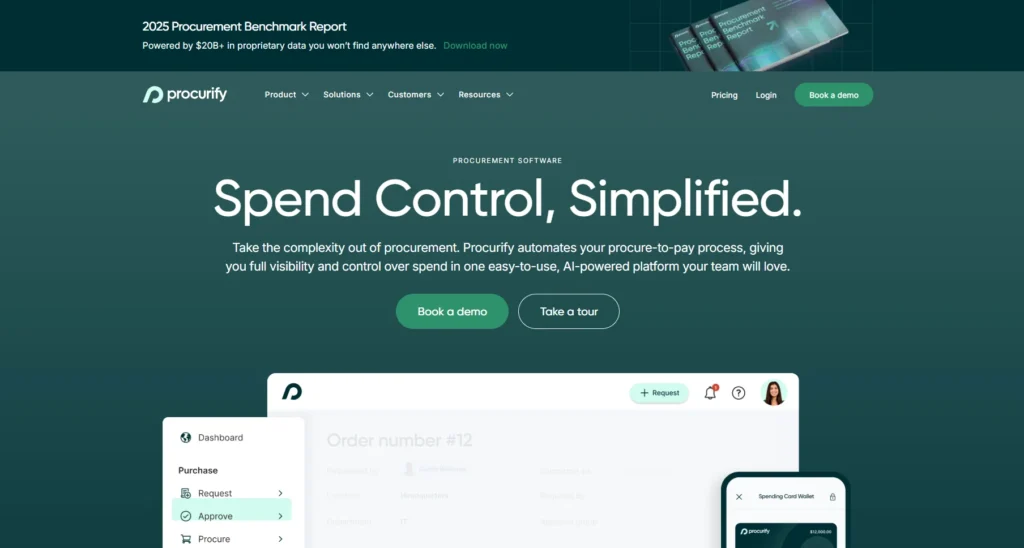
Procurify is cloud eProcurement and spend management software designed with SMBs and developing enterprises in mind. It includes making purchases, approvals, expense management, and cooperation with the suppliers. It has been considered easy to use and navigate by its users, which results in rapid adoption.
Procurify enables companies to manage budgets, spending, and scale their eProcurement processes and operations over time. Its user-friendly interface is also mobile-friendly and allows teams to carry out eProcurement management on the road. Also, Procurify reporting and analytics will allow managers to gain insights into how to streamline eProcurement .
Features:
- Ordering and authorizing of purchases
- Expense entry and reporting
- Supplier collaboration
- Budget controls
- eProcurement application (Mobile)
Best For: SMBs and medium-sized companies using eProcurement at scale.
Pricing:
- Ranges between approximately 500 dollars (depends on the number of users).
Quick Comparison
| Tool | Pricing | Key Features | Pros | Cons |
| SAP Ariba | $50–$5,500/year (transaction fees apply) | Supplier network, contract management, sourcing, eProcurement automation | Industry standard, Huge supplier network, Strong compliance features | The transaction fee model is costly for high-volume, Complex implementation, and Steep learning curve |
| Oneflow | €17–€45/user/month (Free plan available) | Digital contracts, real-time collaboration, and contract tracking | Modern & user-friendly, Strong collaboration features, e-signature built-in | Limited for full eProcurement , Best for contracts only, Less scalable for enterprise procurement |
| Precoro | $499–$999/month | Purchase orders, approvals, budgeting, reporting, and supplier management | Easy to use, Fast implementation, Good value for SMEs | Lacks some advanced enterprise features, Limited integrations compared to bigger players |
| Team Procure | From $250/month (3 users) | eProcurement workflows, supplier & catalog management, approvals | Affordable for SMEs, User-friendly dashboard, Good for smaller teams | Limited scalability, Fewer advanced analytics, and not as widely adopted |
| NetSuite Procurement | $50,000–$500,000/year. | Full ERP + procurement, finance, inventory, supply chain | Comprehensive ERP, Highly customizable, Strong analytics | Very expensive, Long implementation time, Overkill for small/medium businesses |
| Coupa | $2,500/month+ (Advanced $4,800/year more) | Spend management, sourcing, invoicing, contract lifecycle | Powerful AI-driven insights, Enterprise-grade security, Strong adoption among large companies | Expensive, Complex setup, Not ideal for SMEs |
| Salesforce (Procurement Integration) | From $25/user/month (custom for procurement) | Customizable CRM + procurement add-ons, workflow automation | Strong customization, Deep ecosystem, Scales well with other Salesforce tools | Requires customization, Can get expensive with add-ons, Not procurement-first |
| Vendr | $35K–$38K/year (Free plan available) | SaaS spend management, vendor negotiations, renewals | Specialized for SaaS purchases, Negotiation-as-a-service, Transparent ROI | Focused only on SaaS vendors, High annual cost for SMEs, Limited to subscription context |
| Monday.com | $9–$19/seat/month (Free & Enterprise custom) | Workflow management, procurement templates, and approvals | Very easy to use, Flexible workflows, Affordable for SMBs | Not specialized for procurement, Limited supplier management, needs customization for sourcing |
| Procurify | From ~$500/month (custom quotes) | Purchase approvals, expense policies, budget management, and mobile-friendly | Strong UI, Focus on SMBs, Cloud-native with mobile apps | Some advanced ERP features are missing, Mid-range cost, less suited for very large enterprises |
The Relevance of eProcurement Software
- Cost control: Minimizes maverick expenditure and benefits with bulk pricing.
- Efficiency increase: Automates approvals, document routing, and diminishes human errors.
- Transparency: Comes with complete audit tracks on spend and supplier activity.
- Compliance and governance: Imposes policy and chains of approval.
- Strategic insights: Insight into data will support wiser buying choices.
Trends in eProcurement Software in the Future
- AI and Chatbots: NetSuite AI with quote generation hints at a more general trend of AI-powered procurement assistants
- SaaS spend optimization: Systems such as Vendr and renew-management modules are becoming more in vogue.
- Automation of contracts: Faster contract turnaround will be caused by platforms such as Oneflow that will enhance visibility.
- Predictive spend analytics: The eProcurement systems will predict the requirements and optimize time.
- Sustainability monitoring: You should expect eProcurement solutions to integrate ESG data into supplier assessment and spend reporting.
Conclusion
A smarter eProcurement Software selection process can make your procurement operations more efficient, helping you to eliminate wastage and control costs. Whether you want an enterprise-level platform such as SAP Ariba or Coupa or a more versatile and nimble tool such as Monday.com, there is a solution that will suit your needs and fit your budget.
Prices range extremely broadly, so companies will have to strike a feature-cost balance prior to making their choice. The investment in procurement software does not come at a price of only automating processes, but it involves gaining controls, compliance, and long-term cost savings.
FAQs
1. What is eProcurement Software?
Purchasing software is implemented to automate purchasing functions, vendor management, and expenditure, and to facilitate the administration of approval in an automated manner, yet with compliance.
2. What are the reasons why a company should invest in eProcurement solution?
It eliminates human error, provides improved supplier management, more visibility into spending, and saves money through automation and analysis.
3. Which eProcurement tool is the most suitable for small businesses?
Precoro, Team Procure, Monday.com, and Procurify are the most suitable solutions to meet the needs of SMBs since these tools are inexpensive and similar.
4. Which eProcurement Software is most well-suited for large enterprises?
SAP Ariba, Coupa, and NetSuite are the best solutions in case an organization has a complicated supply chain.
5. How do I choose the right eProcurement platform for my business?
Consider factors like company size, budget, ease of use, integration with existing tools, and whether you need global scalability or a simple approval workflow.
